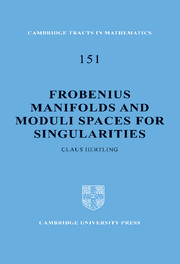Book contents
- Frontmatter
- Contents
- Preface
- Part 1 Multiplication on the tangent bundle
- Part 2 Frobenius manifolds, Gauß–Manin connections, and moduli spaces for hypersurface singularities
- 6 Introduction to part 2
- 7 Connections over the punctured plane
- 8 Meromorphic connections
- 9 Frobenius manifolds and second structure connections
- 10 Gauß–Manin connections for hypersurface singularities
- 11 Frobenius manifolds for hypersurface singularities
- 12 μ-constant stratum
- 13 Moduli spaces for singularities
- 14 Variance of the spectral numbers
- Bibliography
- Index
13 - Moduli spaces for singularities
from Part 2 - Frobenius manifolds, Gauß–Manin connections, and moduli spaces for hypersurface singularities
Published online by Cambridge University Press: 12 September 2009
- Frontmatter
- Contents
- Preface
- Part 1 Multiplication on the tangent bundle
- Part 2 Frobenius manifolds, Gauß–Manin connections, and moduli spaces for hypersurface singularities
- 6 Introduction to part 2
- 7 Connections over the punctured plane
- 8 Meromorphic connections
- 9 Frobenius manifolds and second structure connections
- 10 Gauß–Manin connections for hypersurface singularities
- 11 Frobenius manifolds for hypersurface singularities
- 12 μ-constant stratum
- 13 Moduli spaces for singularities
- 14 Variance of the spectral numbers
- Bibliography
- Index
Summary
The choice (U•, γ1) in Theorem 11.1 induces isomorphisms between spaces which are not canonically isomorphic. Section 13.1 fixes this and the compatibilities of these isomorphisms with respect to coordinate changes and μ-constant deformations.
This is used in section 13.2 for a discussion of symmetries of singularities and in section 13.3 for the (up to now) best application of the construction of Frobenius manifolds in singularity theory: the existence of global moduli spaces for singularities. This really comes from an interplay between polarized mixed Hodge structures and Frobenius manifolds, with the construction in section 11.1 as the link.
Compatibilities
A choice (U•, γ1) as in Theorem 11.1 for a singularity f does not only induce the metric of a Frobenius manifold. It also induces isomorphisms between several μ-dimensional spaces which are not canonically isomorphic (Lemma 13.3). These spaces and isomorphisms behave naturally with respect to μ-constant families (Lemma 13.4) and with respect to isomorphisms of singularities (Lemma 13.6). A part of this is elementary, a part is a direct consequence of the construction in section 11.1. All of it fits to the expectations. But to use it in sections 13.2 and 13.3 we need precise notations and statements. First, in Theorem 13.1 and Theorem 13.2 some results from part 1 are summarized which will be needed in sections 13.2 and 13.3.
Information
- Type
- Chapter
- Information
- Frobenius Manifolds and Moduli Spaces for Singularities , pp. 230 - 247Publisher: Cambridge University PressPrint publication year: 2002
